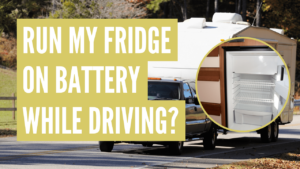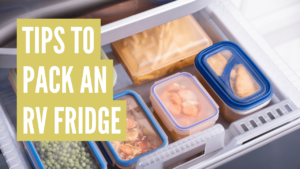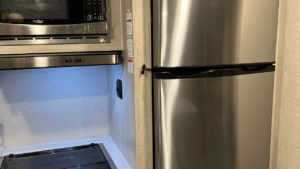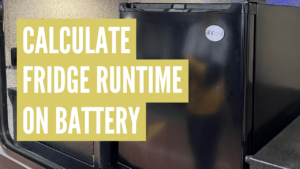Yes, you can run your RV refrigerator on propane while driving. However, while it’s not illegal, you may be required to turn the propane off when going through certain tunnels or bridges. In these cases, signs will be posted to warn you ahead of time, and you may even need to verify the propane is off with an inspector.
That said, below we cover some important safety considerations, the pros and cons of running an RV refrigerator on propane while driving, and alternative methods to power your fridge.
The Debate: Running RV Refrigerator on Propane While Driving
The decision to run an RV refrigerator on propane while driving has long been a topic of discussion among RV enthusiasts and experts. While many vouch for its convenience and efficiency, others express concerns about potential risks.
This has led to the development of a lot of myths! Let’s look at a few I’ve seen floating around on other blogs and forums.
Myth Busters: Propane Edition

Myth 1: It’s illegal to drive with propane on.
Fact: There’s no overarching law against using propane while driving in the United States (check with local laws if you live outside the US). However, specific regulations might apply in certain areas, especially in tunnels or bridges.
Myth 2: You can get fined by the police if you have your propane on while refueling.
Fact: First, you won’t get fined by the police. Second, you should be more concerned about spark-producing appliances while refueling, so you will want to shut your fridge off.
Myth 3: The refrigerator will stay cold enough while I’m driving if it’s precooled – no need to worry.
Fact: This one I hear a lot. And there may be some truth to it depending on the make and model of the fridge. In fact, we recommend precooling your fridge if you do attempt this (mixed with other cooling methods). But, many refrigerators won’t stay cold enough using this method alone, and the only way to tell is to use a fridge thermometer to ensure your food stays within a safe temperature zone (I recommend one with an alarm). This myth is only partially busted.
Expert Opinions and Recommendations
With the right precautions, it’s likely safe to run your refrigerator on propane while driving. Here are some general recommendations:
- Regular Inspections: Frequently check your propane system for signs of wear, damage, or leaks. This includes the tank, lines, and refrigerator components.
- Stay Informed: Be aware of local regulations, especially when traveling through unfamiliar areas with tunnels and bridges.
- Use Quality Equipment: Ensure that all components of your propane system, including the refrigerator, are of high quality and meet industry standards.
- Turn-off Appliances When Refueling: Just remember, if you do run your fridge on propane while driving, you’ll want to turn it off (and any other spark-producing appliances) when refueling.
While there are valid concerns about running an RV refrigerator on propane while driving, it can be done safely and efficiently with the right precautions and knowledge.
That said, there’s still some risk, so it’s up to you to decide if you want to run your fridge on propane while driving.
Related: How to Run an RV Fridge on Propane Step-by-Step
Advantages of Running on Propane While Driving
Using propane as a power source for your RV refrigerator while driving offers several distinct advantages. While the debate on its safety continues, there’s no denying the benefits it brings to the table when used responsibly.
- Maintaining Consistent Temperatures for Food Safety: Propane allows the refrigerator to maintain a steady temperature, ensuring that the food inside remains at a safe temperature. This is especially crucial for perishable items like meats, dairy, and certain vegetables. Inconsistent temperatures can lead to food spoilage, which not only results in wasted food but can also pose health risks. Running on propane helps avoid these temperature fluctuations.
- Energy Efficiency and Cost Savings: Propane-powered RV refrigerators are designed to be highly efficient. Plus, propane is typically more cost-effective than electricity.
- Less Strain on the Battery: Using propane reduces the strain on the RV’s battery, ensuring it lasts longer and requires less frequent recharging.
- Flexibility: Whether you’re driving through remote areas without access to electric hookups or simply don’t want to stop frequently, propane offers the flexibility to keep going without interruptions.
- Peace of Mind: Knowing that your food is being stored at a safe temperature and that you have one less thing to worry about can make your journey more enjoyable.
Cons of Running an RV Refrigerator on Propane While Driving
While running an RV refrigerator on propane while driving offers several advantages, it’s essential to be aware of the potential drawbacks.
- Tunnel and Bridge Restrictions: Some tunnels and bridges have propane restrictions in place, so you may need to pull over and turn off your propane and prove it to an inspector. Technically, you would have to prove the propane is off whether you are running the fridge on propane while driving or not.
- Leak Due to Road Vibration: A leak in the propane lines is more likely to happen due to road vibration while traveling, which you may not notice as easily as you would if you were stationary at a campground.
- Forgetting to Turn the Fridge Off When Refueling: Forgetting to turn off your fridge when you stop to fuel up is only possible if you have it running in the first place.
- Altitude: Traveling through high altitude can affect the propane fridge’s performance, causing it to not cool properly. A fridge thermometer will help alert you of any major temperature fluctuations while traveling.
Tips for Running an RV Fridge on Propane While Driving
If you choose to run your RV refrigerator on propane during your travels, it’s important to take certain precautions to ensure both safety and efficiency. Here are some expert-recommended tips to guide you:
Ensure Propane Tank Levels are Adequate
Before hitting the road, check the propane tank levels. An adequately filled tank ensures you won’t run out of propane midway, especially during longer trips. If you notice the levels are low, it’s good practice to refill the tank. This guarantees the smooth operation of your refrigerator and ensures you have enough propane for other RV appliances.
Related: How Much Propane Does an RV Refrigerator Use?
Regular Inspections are Crucial
The propane system in your RV, including the lines, connectors, and the refrigerator’s burner assembly, plays a pivotal role in the safe operation of your refrigerator. Regularly inspecting them helps in the early detection of potential issues.
Be Mindful of Restricted Areas
While there’s no overarching law against using propane while driving, certain areas have specific restrictions. Some tunnels, bridges, and ferries may have regulations against using flammable materials, including propane.
Monitor Internal Temperatures
The primary purpose of your RV refrigerator is to keep food and beverages at safe temperatures. Using a fridge thermometer can be invaluable in this regard. It allows you to monitor the internal temperatures, ensuring they remain within safe limits. If you notice any significant fluctuations, it might indicate an issue that needs addressing. Regular monitoring not only ensures food safety but also helps in the early detection of potential refrigerator problems.
Alternatives to Using Propane While Driving
While propane is a popular choice for powering an RV refrigerator on the move, there are several other methods available.
Important: Some of these methods may not be available with your fridge or camper model.
1. Running the Refrigerator on 12V DC Power
Many modern RV refrigerators can operate on 12V DC power, allowing you to run your RV fridge off the battery. This provides a consistent power source without relying on propane. You can find this option in three-way absorption fridges and some compressor models.
2. Using an Inverter to Convert DC to AC
If you have a two-way absorption fridge, which is typically propane or 120V AC powered, you can use an inverter to convert 12V DC from the batteries to 120V AC, allowing the fridge to run on battery power while driving.
3. Using the Onboard Generator
Many RVs come equipped with an onboard generator, which can be used to power the refrigerator and other appliances. The onboard generator can provide a steady power source, ensuring the refrigerator operates efficiently throughout the trip.
4. Tips to Keep Your Fridge Cold Without Power
Sometimes, the best solution is to keep the refrigerator cold without relying on any power source. Some methods include:
- Pre-cooling items before placing them in the fridge.
- Using ice packs or frozen water bottles to maintain low temperatures.
- Avoid opening the fridge frequently.
- Ensuring the refrigerator is well-insulated.
For more detailed tips, check out our guide to keeping an RV fridge cold while driving.







I think you need to talk to the Australian Gas Authority, I have and was told it is illegal to have the tap turned on as well as run an appliance. Common sense would dictate the in an accident situation, a gas line could fracture and cause a fire.
I’m gonna go out on a limb here and assume the “Australian Gas Authority” is in Australia. If it’s illegal in Australia, then don’t do it! And as stated, it’s “likely safe”, but “there’s still some risk”. If you’re not comfortable with it, don’t do it. There are alternative methods above.